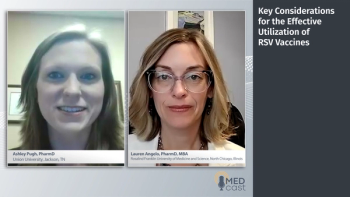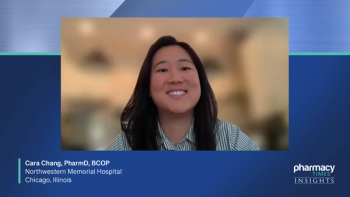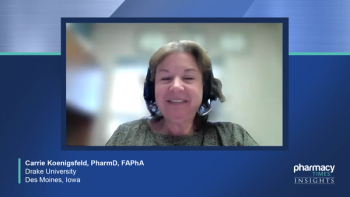
Experts give important background information on respiratory syncytial virus (RSV), as well as the key clinical considerations that are associated with RSV vaccine use.

Experts give important background information on respiratory syncytial virus (RSV), as well as the key clinical considerations that are associated with RSV vaccine use.

A clinical pharmacy specialist examines treatment strategies for EGFR exon 20 insertion mutations, referencing data from the PAPILLON trial, and addresses the challenges associated with managing brain metastases in this patient population.

Cara Chang, PharmD, BCOP, provides a comprehensive analysis of the MARIPOSA-2 trial, evaluating the various study arms and interpreting the practice-changing data presented.

American Diabetes Association Scientific Sessions speaker Ivan de Araujo discusses how regulation of blood glucose levels and the influence of food preferences can be significant for diabetes care.

HOPA’s DEI Advisory Board Chair discusses how creating safe environments, using correct pronouns, and being willing to talk about patients’ mental and physical needs are significant when providing care to LGBTQIA+ patients.

Heidi Finnes, PharmD, BCOP, FHOPA, discusses the evolving landscape of treatment for patients with cutaneous malignancies and melanoma.

McKesson is helping to address financial challenges facing independent pharmacies.

Zahra Mahmoudjafari, PharmD, MBA, BCOP, FHOPA, discusses the impact of CAR T cell and bispecific therapies in treatment of patients with hematological malignancies.

Key opinion leaders (KOLs) provide key takeaways on metastatic breast cancer and early breast cancer, emphasizing the enthusiasm surrounding recent advances in the field and the potential for improved patient outcomes.

An RSV medical expert provides an overview of the RENOIR trial, which investigated the efficacy and safety of an adjuvanted RSV vaccine in adults aged 60 years and older, focusing on the vaccine's effectiveness in preventing RSV-associated lower respiratory tract infections and presenting other crucial findings from the study.

Carrie Koenigsfeld, PharmD, FAPhA, reviews the pivotal findings from the AReSVi-006 trial that supported the approval of the adjuvanted RSV vaccine, including its efficacy in preventing lower respiratory tract RSV, associated adverse events, and important study limitations that may have influenced the results.

Rose DiMarco, PharmD, BCPS, BCOP, shares insights into the evolving treatment landscape for patients with breast cancer with specific mutations.

Scott Soefje, PharmD, MBA, BCOP, FCCP, FHOPA, discusses the crucial role pharmacists play in providing supportive care for patients with cancer.

Jordyn P. Higgins, PharmD, BCOP, discusses the evolving treatment landscape for small cell lung cancer (SCLC).

Niki Shah Vice President of Impact Innovation and Activation at McKesson, discusses efforts to advance health equity and access through community pharmacy initiatives.

W. Timothy Garvey expressed concern over limited access to effective obesity medications like Ozempic due to shortages and high costs, urging stakeholders to work together on developing solutions.

Semaglutide significantly improved heart failure symptoms and quality of life through weight loss and direct effects on heart tissue.

Jennifer Goldman discusses the importance of collaborative care between providers like endocrinologists, cardiologists, primary care physicians, and pharmacists to manage diabetes and prevent cardiovascular events.

Managing these treatments involves many considerations, including glycemic control and nutrition, among others.

A renowned lung cancer pharmacy specialist presents the efficacy and safety data from the phase 3 FLAURA2 trial, emphasizing progression-free survival and overall survival outcomes, and shares additional insights from the MIRAPOSA study.

The study shows that tirzepatide significantly improves secondary outcomes in patients with sleep apnea.

Cara Chang, PharmD, BCOP, examines the prevalence of EGFR positivity, provides an overview of clinically relevant EGFR mutations, and discusses therapeutic options for EGFR-positive mutations.

Tim Mok, PharmD, BCOP, BCPS, discusses innovative therapies that are changing the treatment options available for patients with hematologic malignancies.

Niki Shah Vice President of Impact Innovation and Activation at McKesson, previews the 2024 McKesson ideaShare conference.

American Diabetes Association Scientific Sessions speaker Ivan de Araujo emphasizes the importance of the pharmacist’s role in diabetes care and his hopes for the future of care.

Ryan Haumschild discusses the evolving treatment landscape for patients with multiple myeloma.

Reducing maternal mortality through improving access, screening, education and providing support during pregnancy.

The panelists share their concluding thoughts on the importance of collaboration between academic and community practices to achieve the best outcomes for their patients, which includes seeking second opinions and incorporating insights from tumor board discussions.

Medical experts discuss their perspectives on therapy approval and the significance of formulary inclusion, emphasizing the need to carefully consider both toxicities and benefits, which may ultimately lead to the operationalization of a drug in clinical practice.

Creating a supportive environment and staying informed on the latest research can be significant when supporting patients in the LGBTQ+ community, notes Olivia Buckoski, PharmD, AAHIVP, HIVPCP.